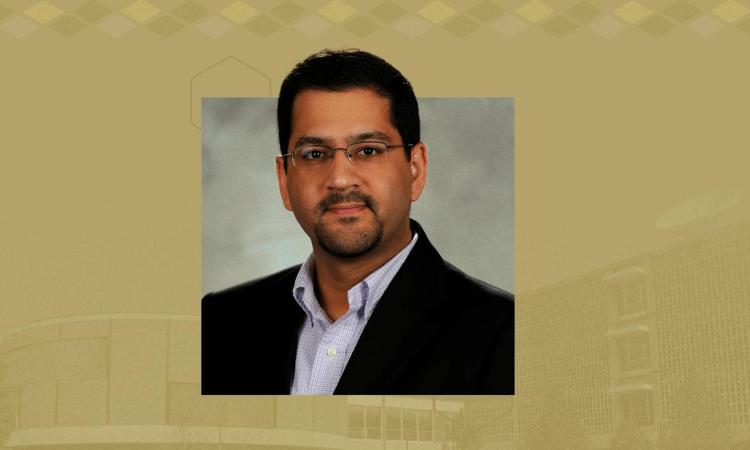The ECE researcher won the award for his neuromuscular diagnostic technology, named Myomatrix.
(text and background only visible when logged in)

(text and background only visible when logged in)
Georgia Tech School of Electrical and Computer Engineering (ECE) senior research engineer Muneeb Zia has won the Georgia Life Sciences (GLS) Golden Helix Innovation Award for his Myomatrix system.
Myomatrix is a neuromuscular diagnostic technology Zia developed during his Ph.D. studies at ECE under the supervision of Professor Muhannad Bakir, which he completed in 2018.
The Golden Helix Awards are given by the GLS, a non-profit that promotes the interests and growth of the state’s life sciences industry. They honor companies and individuals making significant contributions to scientific discovery, health innovation, and economic growth in the state and beyond. The Innovation Award is given to work that goes beyond the traditional paradigms and has the potential to significantly impact human health, agriculture, or environmental sustainability.
Myomatrix uses a high-density, flexible array of electromyography (EMG) electrodes. These small sensors, placed on the skin, detect the electrical signals muscles produce when they contract.
By capturing these signals with unprecedented spatial resolution (where the signals originate) and temporal resolution (how quickly they change), Myomatrix gives researchers a detailed view of muscle function. This insight supports the study of motor control, the diagnosis of neuromuscular disorders, and the development of more effective rehabilitation therapies.
Unlike traditional EMG technologies, Myomatrix combines minimally invasive access with cellular-level detail, supporting applications from basic neuroscience to clinical research.
The technology is used by more than 200 researchers globally, and ongoing efforts are underway to translate Myomatrix into clinical use, aiming to enable earlier and more accurate diagnosis of neuromuscular disorders. This could lead to better patient outcomes and substantially reduce the costs linked to delayed or incorrect diagnoses.
Zia is helping to drive this transition in his role as Associate Director of Technology & Innovation at CAMBER, a joint Georgia Tech–Emory research center supported by the National Institutes of Health (NIH). Through CAMBER, he is expanding his broader research in minimally invasive diagnostics, with a focus on transforming lab innovations—such as Myomatrix—into technologies that directly benefit patients.
(text and background only visible when logged in)
Related Content
Yu Receives SRC Technical Excellence Award
The ECE professor was honored for advancing open-source tools and memory technologies shaping future computing.
Bakir Named Inaugural GlobalFoundries Termed Chair
The appointment recognizes Bakir’s leadership in advanced packaging and expands Georgia Tech’s role in the field.

